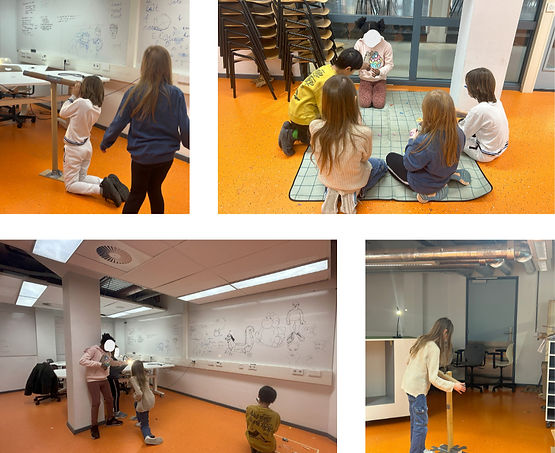Ankita Arora
The Tube

A Toy Designed to Ignite Curiosity and Exploration in Children Aged 7-12
Technical University of Delft, Netherlands
Project Type
Team
Skills
Tools
Year
Product Design
Ankita Arora, Kiet Stiemer, Roosje Lugthart
Rapid Prototyping, Teamwork, Time Management
Figma, Woodworking Machines
2023
Project Overview:
The Tubes is a play concept designed to stimulate curiosity and exploration in children aged
7-12. Inspired by developmental psychology, it supports three key areas of growth: cognitive, physical, and social-emotional.
-
Cognitive Development: Encourages multi-sensory experiences and satisfies children's natural curiosity through interactive play.
-
Physical Development: Promotes independence, collaboration, and creativity, while also enhancing both fine and coarse motor skills.
-
Social-Emotional Development: Fosters social interaction and teamwork, helping children develop stronger peer relationships.
Project Outcome:
Designed for outdoor play, The Tubes provides a creative outlet where children can express themselves individually or with others while navigating real-world cause-and-effect scenarios.
Challenge Discovery

Freedom
Challenge
Socialization
Safety
Variety
Lea Magnano, a Design for Interaction graduate, identified distinct child archetypes in outdoor play through her master thesis, "Diversity in Outdoor Play." For this project, we focused on the "Rucksack" character and designed a toy tailored to their needs. Rucksack characters are curious, cooperative and organised. They like challenges, freedom to explore and variety in their play.
Rucksack
The Challenge
"Creating a play experience that fosters curiosity, exploration, and independent learning while encouraging social interaction—something most urban play environments lack."
The goal of this design was to create an outdoor play experience that stimulates their curiosity and supports both independent and collaborative play.
The Process
Design Process
Here’s a little bird’s eye view of the design process
The initial research for this project was conducted by Lea Magnano in her master's thesis. Building on her findings, the design process was initiated and conducted tests with the children over a two-week period. Below, you will find a detailed overview of the concept development.

So, let's come straight to the point...
Why The Tube?
The Tubes support three key areas of growth:
Cognitive, Physical, and Social-Emotional, which is very important for the holistic development of children.
Cognitive Development
-
Encourages Rucksack children to explore and satisfy their natural curiosity.
-
Promotes a rich, multi-sensory experience that enhances learning and discovery.
Physical Development:
-
Fosters shared experiences, encouraging interaction and cooperation with peers.
-
Supports independence while also enabling collaboration.
-
Stimulates creativity through active and imaginative play.
Social-Emotional Development:
-
Encourages movement between different tubes, improving coarse motor skills.
-
Involves fine-tuned adjustments, helping to develop precision and fine motor skills.
Based on the Wheel of Developmental Psychology (Zaal & Boerhave, n.d.)
The Design
How does this Tube work?
On one end, children can feed their imaginations by dropping in treasures from nature—sticks, sand, and leaves—transforming them into a symphony of sounds as they cascade through the Tube. As they peer through the observation lens on the other side, a world of wonder unfolds: the ordinary becomes extraordinary! Magnifying glasses inside the Tube warp and twist the shapes of the items, inviting children to discover new perspectives and playful surprises.
The Tubes aren't just play structures; they’re portals to exploration and discovery, where every sound, sight, and sensation ignites creativity and connection with the world around them. They are adaptive and can be placed in school playgrounds, public playgrounds, forests and/or even farms! A "System of Tubes" can be incorporated to facilitate unique interactions with the tube. This system provides a customizable and tailored opportunity for children to learn and play, allowing them to shape their experiences based on their preferences and surroundings.

The Prototype
Let's have a look at the "Prototype"
The prototype was created using cardboard, insulation foil (for kaleidoscope), masking tape, and wood. User tests were conducted indoors to ensure the safety of the schoolchildren visiting the campus. Accordingly, the materials placed inside the tubes were selected with care, including scraps of MDF, clips, and various fabrics. These materials were chosen for their distinct sensory attributes—some to create engaging sounds, while others were selected for their visual appeal and vibrant colours.
.png)

Prototype and Materials
Evaluation Plan
What’s the purpose of creating a product if you can’t evaluate its effectiveness?
Some of the questions we had in mind for the testing phase -
-
How do the children engage with the tube? Do they feel inspired to play indefinitely?
-
How intuitive is the tube for children when no instructions are provided?
-
To what extent do children return to the tube after engaging in other activities?
and more....
Non-Task based
Children explore the concept independently without any goal.
Aim: To understand if it's intuitive enough
Method: Observation
The intended use is explained
Aim: To understand if the children are aware of its functionality and whether the design presents an appropriate level of challenge.
Method: Semi-structured informal interviews
Task based
User Test
Did the children like it?
We conducted tests with five children from the international school. Their responses revealed that they described the experience as "fun" nine times, "cool" and "creative" seven times, and simply "cool" six times.



User Test at Technical University of Delft, Netherlands
Well, Leonardo Da Vinci said -
“Art is never finished, only abandoned.”
So, we proposed some Design Recommendations (Ofcourse)! Want to know what they are? Let's have a virtual coffee chat!